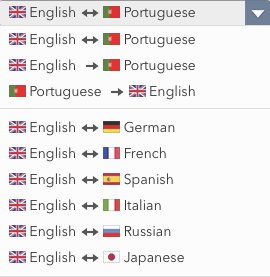Top Tips for Perfect English to Portuguese Translation Provider
Accomplishing outstanding English to Portuguese translation calls for greater than plain word-for-word conversion; it requires an understanding of social subtleties and linguistic complexities. Selecting certified translators who are both culturally conscious and fluent is paramount. Just as crucial is the technique of localization, which involves tailoring web content to local variants. Additionally, using contextual recommendations guarantees that the initial tone and definition are protected. However, the trip does not end there; a rigorous evaluation and modifying procedure is necessary. What other important factors should be taken into consideration to elevate translation top quality better?
Understand Cultural Nuances
When converting from English to Portuguese, comprehending the social subtleties is necessary for generating a exact and powerful message. The Portuguese-speaking globe is diverse, incorporating various areas, each with its distinct customizeds, idioms, and social standards. A translator must be in harmony with these subtleties to make certain that the translation not just shares the desired message yet also resonates with the target audience.
For instance, idiomatic expressions in English may not have straight equivalents in Portuguese. A phrase that works well in one society can result in complication or misinterpretation in another. Comprehending local languages and variants, such as those located in Brazil and Portugal, is important; words may hold various connotations or usages depending on the location.
Additionally, cultural context plays a significant function in translation. Eventually, a thorough understanding of cultural subtleties is crucial for delivering translations that are not just linguistically accurate however likewise culturally appropriate and appealing.
Select Certified Translators
Picking qualified translators is a crucial step in guaranteeing the accuracy and high quality of English to Portuguese translations. A translator's knowledge not only incorporates language effectiveness but additionally a deep understanding of cultural context, colloquial expressions, and industry-specific terms. When choosing a translator, focus on those with official training in translation research studies or linguistics, along with pertinent accreditations that demonstrate their expert capability.
Experience plays a crucial function as well; translators specializing in certain fields-- such as lawful, medical, or technological-- are most likely to provide precise translations tailored to the sector's standards (English To Portuguese Translation). Additionally, consider their portfolio and client testimonies to evaluate their previous job top quality and dependability
Engage translators who are native Portuguese audio speakers, as they possess a natural understanding of the language's subtleties and local languages. This familiarity enhances the translation's credibility and efficiency.
Usage Contextual Recommendations
When translating, it is necessary to identify idiomatic expressions and cultural referrals that might not have direct equivalents in Portuguese. Certain phrases that reverberate in English may call for adaptation to convey the exact same psychological weight or cultural relevance in Portuguese. Using contextual recommendations can aid translators pick the ideal terminology and design, therefore boosting the total clarity and impact of the translation.

Concentrate On Localization
Localization plays a vital duty in the translation procedure from English to Portuguese, as it makes sure that the equated content is pertinent and culturally ideal to the target market. English To Portuguese Translation. This procedure exceeds mere translation; it involves adapting the web content to the cultural, social, and linguistic nuances certain to Portuguese-speaking areas
Comprehending regional expressions, customs, and choices is crucial. Certain phrases or references that reverberate with an English-speaking audience may not have the very same impact on Portuguese speakers. It is necessary to take into consideration local variants, such as Brazilian Portuguese versus European Portuguese, as each has distinct vocabulary and stylistic distinctions.
Furthermore, localization encompasses format, such as date and time styles, currency, and dimension units, visit this page which can differ substantially throughout cultures. This interest to detail fosters a link with the target market, boosting involvement and understanding.
Furthermore, utilizing neighborhood languages and jargon can supply credibility, making the material extra relatable. By concentrating on localization in English to Portuguese translation, businesses can successfully connect their message, develop trust with their audience, and ultimately achieve their desired purposes.
Review and Edit Completely
Comprehensive testimonial and modifying are vital actions in the translation process, especially when transforming English web content into Portuguese. This stage guarantees that the equated material not only keeps the original significance however additionally reverberates well with the target market. Offered the linguistic and cultural subtleties, a precise approach to review and editing is necessary.
Begin by contrasting the original English text with the Portuguese translation, paying attention to tone, context, and terms. It's vital to guarantee that colloquial expressions and social referrals are suitably adjusted for the Portuguese target market. Engaging a second translator or a native speaker for this review procedure can offer invaluable insights and capture mistakes that might have been overlooked.
Furthermore, check for grammatical precision and stylistic uniformity throughout the document. Common difficulties such as incorrect cognates or uncertain expressions must be addressed to stay clear of misinterpretation.
Verdict
Achieving phenomenal English to Portuguese translation services requires a thorough method that encompasses understanding cultural nuances, selecting qualified translators, utilizing contextual references, focusing on localization, and conducting comprehensive evaluations and edits. Each component plays a critical role in making sure that translations are not only precise yet additionally resonate with the target audience. By executing these investigate this site techniques, companies can enhance the performance of their interaction and foster a deeper link with Portuguese-speaking target markets.
Accomplishing remarkable English to Portuguese translation needs more than mere word-for-word conversion; it demands an understanding of cultural nuances and etymological complexities.Choosing qualified translators is a crucial action more helpful hints in guaranteeing the precision and quality of English to Portuguese translations.Thorough review and editing and enhancing are vital actions in the translation procedure, particularly when converting English web content into Portuguese.Begin by comparing the initial English message with the Portuguese translation, paying close focus to tone, context, and terms.Achieving extraordinary English to Portuguese translation solutions necessitates a detailed approach that encompasses understanding cultural subtleties, selecting qualified translators, utilizing contextual referrals, prioritizing localization, and conducting comprehensive evaluations and edits.